 Low-fat diets promote weight gain while high-fat diets can help you lose excess weight.
Low-fat diets promote weight gain while high-fat diets can help you lose excess weight.
The prevailing belief over the past 30 years or so has been that the only effective way to lose weight is through a low-fat, calorie restricted diet. Fat has been pegged as the primary villain in our fight against flab because it is believed to be the most fattening component of our food. It is generally believed that the fat in our diet is somehow automatically absorbed directly into our fat cells, so the less fat we eat, the better. This belief has been pounded into us by the media, bestselling diet books, doctors, weight loss gurus, and even government agencies. Store shelves are filled with no-fat and low-fat foods of every kind. Lean meat, fish, and chicken (white meat only, without the skin) is the preferred choice for diet conscious individuals.
We've been avoiding fat for the past 3 decades and where has it gotten us? Fat, that's where! We are fatter now than ever before. Sixty percent of Americans are now overweight, 30 percent are obese. It is obvious that the low-fat approach to weight loss has not worked.
People have lost weight on low-fat diets, at least initially. You may have had some success yourself. But where is all that lost weight now? Is it back on your thighs, hips, and belly? If so, your weight loss diet hasn't done you a bit of good. If your diet was successful, truly successful, you should be at or near your ideal weight right now.
Most people who are overweight have tried dieting. Many have struggled through numerous diets, yet they are still overweight. The sad fact is that low-fat diets don't work. Oh sure, you can lose a few pounds at first, but over time, the weight comes right back.
One out of every three people who go on weight loss diets regains their weight within one year. According to the Mayo Clinic, within 5 years 95 percent of those people who go on weight loss diets regain all the weight they lost. That's a 95 percent failure rate! Those 5 percent who do manage to keep the weight off for more than 5 years continue to carefully watch what they eat and are physically active with a regular workout schedule.
Low-fat diets are not only unproductive, they are harmful because they actually cause weight gain! That's right. The low-fat diet you struggled with was actually one of the causes of your weight problem. In addition to regaining your lost weight, you generally end up adding on a few extra pounds as well. You would be better off not having dieted at all. The more times you diet the bigger you get. Doctors have a name for this. It's called diet induced obesity. Low-fat diets are one of the primary causes of our obesity epidemic!
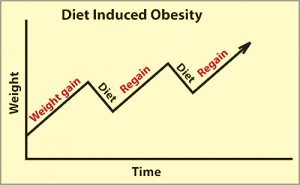
If your weight is relatively stable, meaning you are not rapidly gaining or losing weight, the number of calories you consume is about the same as you are burning off. Even if you are overweight, your calorie input and output are fairly equal.
Calories consumed and calories burned are equal, resulting in weight maintenance (no weight gain or loss), see Figure 1. Increasing physical activity will burn off more calories, so we will assume the level of physical activity does not change over time. The first bar represents the number of calories consumed each day. The second bar represents the number of calories use up each day. Since physical activity is held constant, this bar also represents your metabolic rate or the rate at which you burn off calories.
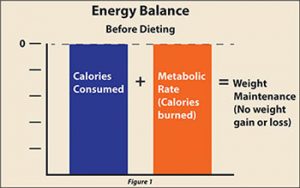
Let's say you start a low-fat, calorie restricted diet by reducing your calorie intake by 200 calories/day (see Figure 2). Since you are now eating fewer calories than you are burning, you experience weight loss. Most people see some positive results when they first start a diet.
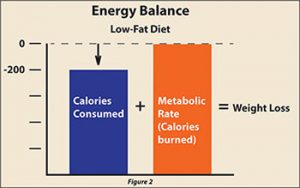
Whenever you cut down on your fat and calorie intake for an extended period of time, as you would with a low-fat diet, your body interprets this as a famine. In response to the perceived famine, your body shifts its metabolism into a lower gear. This is a natural survival instinct that is programed into each of us. By slowing down your metabolism you can survive on fewer calories and less nutrients. This way your chances of surviving the famine are increased.
Consequently, when you decrease calorie intake, your metabolism will gradually slow down to match calories you are consuming (Figure 3). Calorie intake again equals calorie output and weight loss stops.
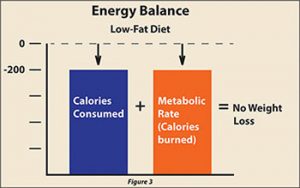 In order to keep losing weight, you need to reduce the number of calories you eat even more (Figure 4).
In order to keep losing weight, you need to reduce the number of calories you eat even more (Figure 4).
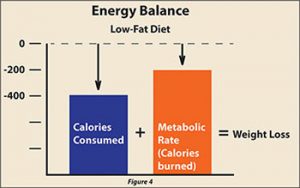 However, in response to the reduced calorie intake, your metabolism slows down even more to maintain an energy balance (Figure 5).
However, in response to the reduced calorie intake, your metabolism slows down even more to maintain an energy balance (Figure 5).
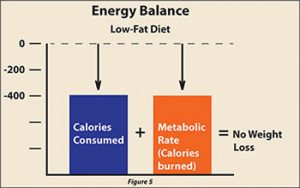 This process continues as long as you remain on the diet. You can reduce the amount of food you eat to starvation levels and still not lose any weight (Figure 6).
This process continues as long as you remain on the diet. You can reduce the amount of food you eat to starvation levels and still not lose any weight (Figure 6).
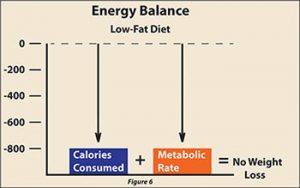 As you continue with the diet you must struggle with constant hunger and temptation. It takes a lot of willpower and effort to be successful. At some point, you are going to end the diet. You can't remain on this type of diet forever because not only is it uncomfortable, it is unhealthy and can lead to malnutrition and poor health.
As you continue with the diet you must struggle with constant hunger and temptation. It takes a lot of willpower and effort to be successful. At some point, you are going to end the diet. You can't remain on this type of diet forever because not only is it uncomfortable, it is unhealthy and can lead to malnutrition and poor health.
When you start adding a little more food into your diet, your calorie intake increases but your metabolism remains depressed (Figure 7). The result is weight gain. Over time you will gradually relax your food restrictions and eat more.
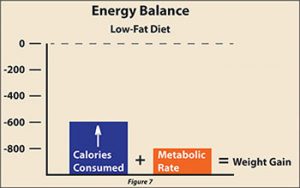 When your body realizes that the famine is over, your metabolism will gradually speed up (Figure 8).
When your body realizes that the famine is over, your metabolism will gradually speed up (Figure 8).
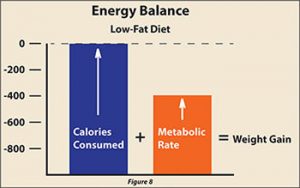 In time, your calorie intake and metabolism will return to the levels they were before you started the diet (Figure 9). Since it takes some time for your metabolism to recover, by the time it normalizes, you have not only regained all your lost weight but generally a few extra pounds as well. The end result is that you are heavier now than before you started the diet. This cycle may take 6 months to complete or it may take 5 years. As noted by researchers at the Mayo Clinic, 95 percent of dieters regain all their weight within 5 years. This is why low-fat diets are doomed to failure from the very start.
In time, your calorie intake and metabolism will return to the levels they were before you started the diet (Figure 9). Since it takes some time for your metabolism to recover, by the time it normalizes, you have not only regained all your lost weight but generally a few extra pounds as well. The end result is that you are heavier now than before you started the diet. This cycle may take 6 months to complete or it may take 5 years. As noted by researchers at the Mayo Clinic, 95 percent of dieters regain all their weight within 5 years. This is why low-fat diets are doomed to failure from the very start.
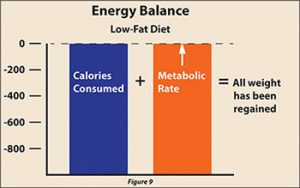 Since the diet didn't work, you may go on another diet, ending with the same result and then another and another. Each time you diet you get bigger and bigger. While the type of food you eat does influence body weight, it can be the dieting itself that is the biggest contributor to your weight problem.
Since the diet didn't work, you may go on another diet, ending with the same result and then another and another. Each time you diet you get bigger and bigger. While the type of food you eat does influence body weight, it can be the dieting itself that is the biggest contributor to your weight problem.
All low-fat diets promote diet induced obesity. Over the years, there have been various twists to the standard low-fat diet, you have the cabbage soup diet, grapefruit diet, macrobiotic diet, lemonade diet, the 3-hour diet, Beverly Hills diet, volumetrics, liquid diets, and on and on. If the low-fat approach to dieting worked, why the need for so many diets? The simple truth is they don't work, not in the long run anyway.
Albert Einstein defined insanity as, "Doing the same thing over and over again but expecting a different result." We have tried low-fat dieting over and over again with the same result. No matter what name you put on it, to keep trying low-fat diets over and over is insane!
The reason why low-fat diets do not work is because they do not include enough fat. Fat is the secret ingredient to successful dieting. Believe it or not, fat is the ideal weight loss aid!
When a calorie reduced diet includes an ample amount of fat, your metabolism does not change much. It remains elevated as if you were eating full meals. Our ancestors had to survive in times of winter and famine when food was scarce. The game they managed to catch didn't provide them with much fat because the animals were lean due to the general lack of food. During the summer, when food was abundant, their game provided a rich source of fat and our ancestors' metabolism remained high. The presence of fat in your diet tells the body that food is abundant and that the hunting is good, there is no famine.
When you go on a high-fat, calorie restricted diet your metabolism stays normal. You can reduce calorie slightly and loose weight the entire time you are on the diet (Figure 10). As long as you continue to eat a healthy portion of fat, you metabolism will remain normal. Unlike a low-fat diet, you are not forced to keep reducing your calorie intake time and time again to keep losing weight. Another advantage of eating fat is that it helps satisfy hunger. You don't experience the agonizing hunger pangs you would with severe calorie restriction. It is almost like a non-diet diet. When your weight loss goal is reached and you begin to eat more calories, you do not experience weight gain because your metabolism was never depressed (Figure 11). Instead of gaining weight, you simply stop losing it.
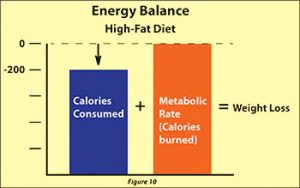
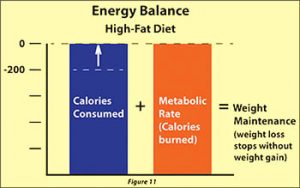 Compared to a low-fat diet, a high-fat calorie restricted diet is a breeze and ultimately much more successful. If you continue to eat sensibly, your weight will stay off.
Compared to a low-fat diet, a high-fat calorie restricted diet is a breeze and ultimately much more successful. If you continue to eat sensibly, your weight will stay off.
Weight loss can be enhanced even further by using coconut oil as your primary source of fat. Coconut oil, more than any other fat, stimulates metabolism, thus helping to keep metabolism elevated during the diet.
In order to take advantage of the metabolic advantage of fat, you need to incorporate an ample amount into your diet. Adding a couple of teaspoons of fat won't do a thing. You need to let the body know that food is abundant and the hunting is good. This means adding the equivalent of 3, 4, 5 or more tablespoons of fat, preferably coconut oil, into your diet.
The ideal weight loss diet is a reduced calorie ketogenic diet, especially a coconut ketogenic diet, where coconut oil provides the primary source of fat. Fat satisfies hunger and can actually help you feel full on less food. You can add the needed fat, reduce total calorie intake, and still eat fully satisfying meals without experiencing the hunger associated with low-fat diets. That's one of the marvelous effects of a ketogenic diet.
To learn more about weight loss using a ketogenic approach I recommend reading my book The Coconut Ketogenic Diet. See the amazing keto diet transformation at http://cocoketodiet.com/?page_id=373. ♦
by Dr. Bruce Fife

